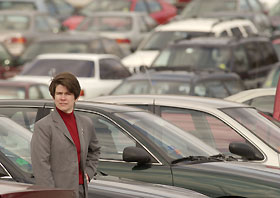For more archives, go to the Advance Archive/Search Page.
Engineering Professor Studies Safety,
Efficiency Of Transportation
Lisa Aultman-Hall likes to cycle to work, but for the first time in her working life, she doesn't.
Connecticut simply isn't as bike-friendly as it could be, she says.
 |
Lisa Aultman-Hall, director of the Connecticut Transportation Institute in the School of Engineering, says America depends too much on the automobile and needs to diversify its transportation systems.
Photo by Peter Morenus
|
Fortunately for biking enthusiasts in the state, however, Aultman-Hall is in a position to promote bicycling and make it safer.
A civil engineer and a professor who teaches undergraduate and graduate-level courses in transportation, Aultman-Hall also conducts research in various aspects of her field. Her biking research has provided, for example, "solid documentation of the higher crash, fall, and injury rates for bicycles on sidewalks and paths when compared to roads," she says.
As director of the Connecticut Transportation Institute, part of the School of Engineering, she oversees an organization dedicated to improving the experience of getting from Point A to Point B in Connecticut, a task that is often fraught with impediments of one sort or another.
Aultman-Hall is a native of Ontario, Canada, who also taught for several years at the University of Kentucky before joining the UConn faculty in 2001. She was surprised by the nature of transportation issues in Connecticut.
"We have diverse transportation problems here, considering how small the state is," she says. "Congested freeways, heavy loads on small highways, and a lack of bicycle lanes and sidewalks are only some of the issues."
To understand the nature and extent of everything from bicycle safety to how people plan and undertake short trips, Aultman-Hall and her colleagues collect data using such tools as GPS receivers and written surveys.
The data shed light on such questions as whether bicycle paths are safe places to bike and walk (they are not particularly safe); and whether people driving around their towns routinely take the shortest and most efficient routes: they don't.
As researchers add to the body of knowledge about how people bike and drive, for example, engineers are able to use that information to plan better, safer, and more diverse transportation models. Elected and appointed officials can also use it to help them make public policy decisions.
Aultman-Hall has been particularly successful in attracting funding for her research on traffic safety for specific drivers and circumstances; freight transportation planning; and traffic behavior.
In each of her research areas, she has been prolific. Her eight years of work in academia have yielded some 19 papers in peer-reviewed journals, 14 conference papers, 59 technical reports, 26 conference presentations, and nine invited presentations.
As often happens in science, research in one area stimulates questions about another. In Aultman-Hall's case, the study of driving behavior in 276 households led to further study of vehicle emissions and how certain types of driving behavior affect emissions.
Aultman-Hall believes that transportation in Connecticut and elsewhere would benefit from regional rather than local decision making, since 'local' travel inevitably involves a number of jurisdictions.
"I think we're on the brink of realizing as a society that much of what we want in terms of quality time and quality of life relates to transportation," she says. "Many of our frustrations relate to transportation. The demands we make on our systems are certainly going to change. People love automobiles and love owning lots of land. That thinking is going to have to change if we're to succeed in developing transportation alternatives."
The term 'diversity' often surfaces in another context, but for Aultman-Hall, it has special relevance in transportation.
"In America we lack diversity and have an almost complete dependence on the automobile, which makes our transportation system very vulnerable," she says. "Educating people about this limitation and seeking ways to diversify our transportation system are very important to my career as a transportation engineer."
Aultman-Hall invests considerable effort in educating audiences both inside and outside the University. She is active with the Transportation Research Board, part of the National Academy of Sciences, and chairs its Committee on Bicycle Transportation. She also participates in the American Society of Civil Engineers' Committee on Human Powered Transportation and has served on several state and national transportation advisory groups.
Aultman-Hall also works to recruit students, especially young women, into her field. In her classroom, she emphasizes two-way communication with students.
"Their ideas and feedback force me to say better, more relevant things that allow me to give them a solid grounding in research fundamentals and help them understand the real-world applications of the science," she says.
And what does she think of the latest headline-grabbing transportation-related real world application of science, the Segway human transporter?
"It's a clever vehicle that belongs on the road in a bike lane, but not on a sidewalk," she says of the machine, which allows a person to move up to 12.5 miles an hour standing upright. "Speed is the issue. But it's an excellent vehicle with excellent promise."

